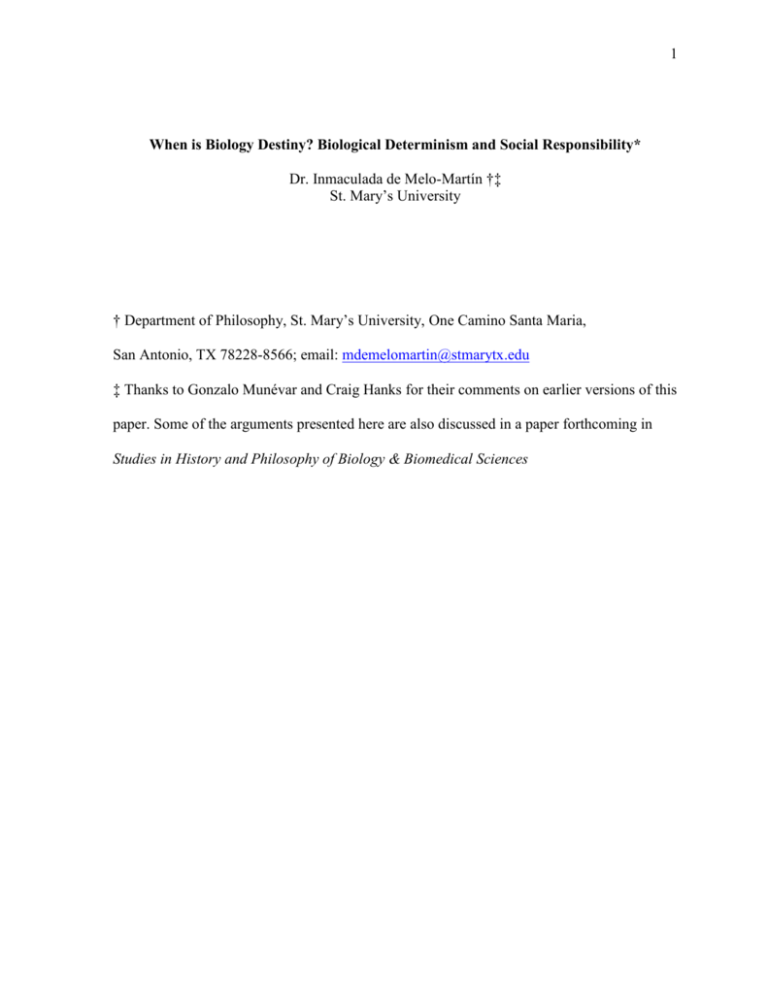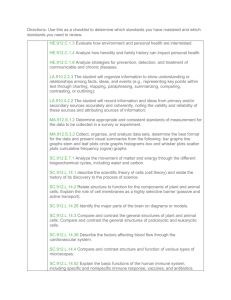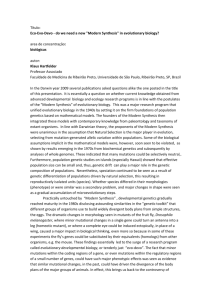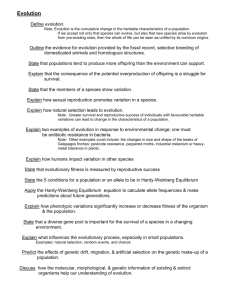When is Biology Destiny? Biological Determinism - PhilSci
advertisement

1 When is Biology Destiny? Biological Determinism and Social Responsibility* Dr. Inmaculada de Melo-Martín †‡ St. Mary’s University † Department of Philosophy, St. Mary’s University, One Camino Santa Maria, San Antonio, TX 78228-8566; email: mdemelomartin@stmarytx.edu ‡ Thanks to Gonzalo Munévar and Craig Hanks for their comments on earlier versions of this paper. Some of the arguments presented here are also discussed in a paper forthcoming in Studies in History and Philosophy of Biology & Biomedical Sciences 2 Abstract I argue here that critics of biological explanations of human nature are mistaken when they maintain that the truth of genetic determinism implies the end of critical evaluation and reform of our social institutions. Such a claim erroneously presupposes that our social values, practices, and institutions have nothing to do with what makes biological explanations troublesome. What constitutes a problem for those who are concerned with social justice is not the fact that particular behaviors might be genetically determined, but the fact that our value system and social institutions create the conditions that make such behaviors problematic. 3 When is Biology Destiny? Biological Determinism and Social Responsibility 1. Introduction. Biological explanations seem to have a wondrous appeal for human beings.1 We have only to look at the history of science to observe this. From Aristotle to Galton to our present day evolutionary psychologists and genetic behaviorists, biological explanations –even if with different forms—seem to be the obvious answer to our quest for understanding human similarities and differences. The Human Genome Project has only increased our expectations for these kinds of answers. Although we thought that our fate was in the stars, now we seem to believe that our destiny is in our genes. The appeal of biological explanations of human nature is often counteracted by the shadow of, for example, unjust public policies promoted by social Darwinists and the eugenic experiments performed by the Nazis. (See, Paul 1998, Kevles 1985) Thus, those who now insist on the importance and the need of biological explanations to solve the problems that loom ahead –from genetic diseases, to social unrest—feel obliged to maintain that their scientific explanations are far from the ideological ones offered by social Darwinists and eugenicists. (See Wright 1994, 7-8) They claim, for example, that genetics in itself is never evil. It is its use or misuse that constitutes a problem. Certainly everybody would agree, they say, that to find the ways to ameliorate the impact of mental illness is inherently good, while the killing of German mental patients by the Nazis is the worst of barbarism. (Watson 2000, 169-208) Furthermore, they argue that if we want for our public policies to solve problems 4 such as criminal behavior, alcoholism, learning disabilities, schizophrenia, or war, we ought to pay attention to the evolutionary history of humankind. Failing to do so is a recipe for disaster. (Cartwright 2000, 341-343; Thornhill and Palmer 2000, 199; Daly and Wilson 1996, 22-24; Buss 1996, 309, 315; Wright 1994, 10-14) Critics of biological explanations of human nature insist that such explanations presuppose (in spite of the disclaimers continually made by supporters) an unsustainable biological determinism. (See Rose 2001; Lewontin 2000; Oyama 2000, Shakespeare and Erickson 2000, 229-245; Rose 2000, 299-318; Bleier 1985; Kitcher, 1985; Gould 1981) They maintain that biological explanations of human behavior or human disease are reductionist; that genes can only be understood as contributing causes; that organisms are in constant interaction with their environment in complex ways; that organisms select environments just as environments select organisms; and that to look for adaptations in every one of our emotions, behaviors, abilities, is simply to misunderstand how natural selection works. However, most critics and supporters of biological explanations seem to agree on one issue, that if biological determinism were correct, then we would be exempt from critically analyzing and maybe transforming our social practices and institutions. (Thornhill and Palmer 2000, 107-111; Buchanan et al. 2000, 24-26; Buss 1999, 18-19, Rothstein 1999, 89110; Nelkin 1999, 156-169; Nelkin and Lindee 1995; Wright 1994, 345-363; Kitcher 1985) Biological determinism points to natural limits constraining individuals and therefore, tends to de-emphasize the influence of social circumstances. Thus, if biological determinism were true, it would seem that no possible social system, educational policy, or nurturing plan could 5 change the status quo, or at least that doing so would require too great a cost. (Wilson, 1978, pp. 132-134) Biology turns out to be a way to justify existing social institutions and to relieve societal guilt. Critics accuse those who use biology to explain every possible human trait of presupposing the truth of biological or genetic determinism. Thus, they try to debunk this doctrine, and with it presumably the claims made by sociobiologists, evolutionary psychologists, or behavioral geneticists. All the while, proponents of these disciplines agree with the claims made by the critics that genetic determinism is false and has problematic implications for our society. Sociobiologists and genetic behaviorists, however, deny that the biological explanations of human nature that they put forward are based on the assumption that human behavior is genetically determined. The focus of this paper is to show that those who criticize biological explanations of human nature might be granting too much to those who propose such explanations when they argue that the truth of genetic determinism implies the end of critical evaluation and reform of our social institutions. This is so because when we argue that biological determinism exempts us from social critique we are erroneously presupposing that our social values, practices, and institutions have nothing, or little, to do with what makes biological explanations troublesome. My argument is then that what constitutes a problem for those who are concerned with social justice is not the fact that particular behaviors might be genetically determined, but the fact that our value system and social institutions create the conditions that make such behaviors problematic. Thus, I will argue that even if genetic determinism were correct, the requirement of assessing and transforming our social practices 6 and institutions will be far from superfluous. Biology is rarely destiny for human beings and the institutions they create. 2. Do Biological Explanations Diminish Social Responsibility? Many people seem to believe that the answer to this question is a resounding, “yes.” If we believe that our genes determine intelligence, then there are no good reasons to keep investing our societal resources in improving the intelligence level of those who cannot do better. Similarly, if the differences between men and women are an inextricable part of human nature, then claims of gender equality are entirely misguided. Contrary to these common beliefs, I want to defend here that societal moral responsibility does not decrease with the truth of biological determinism. I will show that genetic determinism does not require that we relinquish our moral and social accountability. It does not have power enough, even when we might desire for it to have it, to blind us to the simple fact that many of our most severe problems are the consequence of our social practices and institutions. In what follows, I will analyze some of the human traits that have been presented implicitly or explicitly as being genetically determined. Note that my point is not to deny that such traits might be biologically determined. I want to argue that the consequence –i.e. that it prevents social responsibility— does not follow. Nor am I claiming that those who offer biologically based explanations for these traits believe that they are biologically determined; on the contrary, as I have said earlier, most of them go to painstaking lengths to argue that they are not claiming such a thing. And they do so because, 7 along with their critics, they consider biological determinism not only scientifically but also morally problematic. The human traits that I will evaluate are intelligence and reproductive strategies in men and women. I will discuss them in order. 2.A. Intelligence. One of the most contentious claims in the dispute over biological explanations has been the affirmation that intelligence is inheritable and to a high degree immutable. These claims are normally associated with evidence that allegedly shows that whites are more intelligent than African Americans. (See Jensen 1998; Herrnstein and Murray 1994) Presumably the differences in intelligence explain the differences in the social ladder: those who are more intelligent tend to be more successful. The high rates of poverty that afflict our western societies are determined more by intelligence than they are by socioeconomic background. Thus, the argument often goes, using social resources to enrich the education of those at the low end of the cognitive distribution is an inefficient way to distribute our money. It doesn’t matter how many resources we provide for these children, their cognitive abilities and their chances of succeeding in our world, are not going to improve significantly. Society is then doubly exculpated. First, we don’t need to feel responsible for those individuals who do not “make it.” After all, no matter how much we did for them, it would not improve their chances. And second, we do not need to be critical of social practices and institutions that appear to increase the chances that some people are not going to be able to 8 “make it.” After all, if you are smart enough you will, sooner or later, overcome those problems. But do these consequences about abdicating social responsibility follow from the claim that intelligence is genetically determined? I will argue here that they do not. Let’s forget, for the sake of the argument, some of the serious problems that have been pointed out about the concept of intelligence. (Devlin et al 1997; Fraser and Fraser 1995; Jacoby and Glauberman 1995, Rose et al 1984; Gould 1981) Let’s forget that the concept of heritability is a local concept and heritabilities cannot be compared between different populations. Let’s assume that the notion of human intelligence is uniform, that intelligence can be described by a single number, that it is capable of ranking people in some linear order, that it is clearly measured by IQ tests, that it is genetically based, that it is immutable, and that there is a black-white differential in IQ. Let’s also assume that those who do well on IQ tests tend to occupy high positions in academia, in the business world, and in politics. And, that those who do poorly on IQ tests tend to occupy lower positions on the social ladder. This means that there will be a correlation between IQ and wealth and social status: the higher your IQ, the better the chances you have to became wealthy and respected; the lower the IQ, the higher the chances you will be poor. Now, we have presupposed that IQ is immutable, and therefore special education programs to try to increase people’s intelligence levels will not do the job. At this point, it seems that all is lost for those concerned with social equality. Nevertheless, this is the case only if we believe that not only intelligence but also our social context, value system, and political institutions are immutable. But such a 9 presupposition is quite questionable. If such social factors are changeable, then there could be a few things that a society committed to social justice could do. For example, we could decide to pay better those who now occupy low-wage jobs (presumably because they are not smart enough to do any better); this might go a long way toward improving the lives of people who are less smart. Or, we could change the kinds of things we value most. Instead of valuing wealth, we could begin to value things such as the ability to care for others, to keep promises, to enjoy other people’s company, to be concerned with our environment, or to be able to grow a garden. Presumably these traits would be distributed more or less equally across populations, and we could certainly do things to improve them. Or, we could also begin to realize that academics, CEO’s, and scientists, did not get to where they are just by themselves, and just because they happen to be intelligent people. They would not be able to do much without the help of the people who pick up their garbage, clean their houses, or who harvest the vegetables and fruits they eat. Changing our value system and social institutions could certainly go a long way toward improving the lives of those who happen to be less intelligent. Those changes could go as far as to wrest importance from the fact that some people might be more intelligent than others. For example, imagine that tomorrow a new scientific study shows conclusively that the strength required to be able to become a first rate wrestler is hereditary. No matter how much one trains, no matter how many social programs we implement to help people to become better wrestlers, the result would be the same: those who have the necessary genetic material will succeed, those who don’t should give up.2 Now, it is unlikely that in our present social context this would cause too much of a stir. Why? 10 Well, because in our value system wrestling does not rank too high: if you can and want to do it, fine; if you don’t, there are plenty of good things, maybe even better things, that humans can do with their lives. Thus, in a social context in which intelligence is not seen as a necessary condition to have a meaningful life, those who happen to be less intelligent will still have chances. There might be many other traits they do have that might be valued by our society. If my argument is correct, genetic determinists’ claims about intelligence make critical evaluation of our social institutions and values even more important and necessary. 2.B. Sex Differences. Biological explanations have also been prominent, and highly controversial, in matters of sex differences. (See Fausto-Sterling 2000; Tuana 1993) Although trying to explain the differences between women and men in biological terms is far from a new scientific approach, of late sociobiologists and evolutionary psychologists occupy a top position in the field. (See Badcock 2000, 149-187; Cartwright 2000, 92-156, 212-260; Mealey 2000; Thornhill and Palmer 2000, 31-52; Buss 1999, 97-185; Wright 1994, 33-151; Daly and Wilson 1983, Wilson 1978, 121-148) According to these disciplines, the different physical constitutions of the sexes would provide different strategies for maximizing their fitness through the reproduction of the largest possible number of offspring. The psychological characteristics that make males effective reproducers are likely to be different from, and to some extent in conflict with, those that make females effective. If this is so, then genes that are successful in transmitting copies of themselves into future generations are 11 likely to be ones that have different physiological and psychological effects in the male and female bodies that they help to construct. One would expect then for males and females to have different natures, behaviors, and social roles. Differences in reproductive strategies between men and women are related to differences in parental investment. Men produce millions of sperm a day and, without much investment, can theoretically father offspring with different women daily. Women, however, have a much greater investment in each offspring because their eggs are much larger than the sperm; they normally produce only one egg per month and about 400 in their lifetimes, and they usually produce no more than one offspring a year. Furthermore, women are the ones who gestate the fetus in their bodies, and the ones who will nurse and most likely will take care of the baby for years. Thus, women contribute a larger proportion of their reproductive potential and a larger investment in time and energy than men. As a result of these differences in investment, women and men have developed different reproductive strategies: women are selective and choosy and it is in their best interests to hold back until they can identify males with the best genes. It pays men, on the other hand, to be aggressive, hasty, promiscuous, and undiscriminating. Sociobiologists and evolutionary psychologists maintain that modern women have developed, from their successful ancestors, wisdom and prudence about the men with which they consent to mate. Because women seek resources in a partner, and because resources might not be directly discerned, women have developed traits that allow them to identify qualities in men that signal likely possessions or future acquisitions of resources, such as 12 intelligence, ambition, and older age. But having resources is not enough. Women need to make sure that the mate they choose would be willing to invest those resources on them and their offspring. Thus, women seek traits that indicate this willingness to invest, such as dependability and stability, love cues, and positive interactions with children. But of course, characteristics such as good health, size, strength, bravery, or athletic ability are also important to modern women because tall, strong, athletic men offered ancestral women protection and we are descendants of women who chose this way. Men, on the other hand, supposedly have greater desire for short-term mating than do women. The reproductive advantages to ancestral men as a consequence of short-term mating would have been an increase in the number of offspring produced. Modern men thus, express greater desire for a variety of sex partners, are more undiscriminating, have more sexual fantasies, and have a larger number of extramarital affairs. However, because many ancestral women required reliable signs of male commitment before consenting to sex, men who failed to commit would have failed to attract many women. Thus, it was beneficial for ancestral men to seek long-term partnerships. Also, this would have increased certainty in paternity, as well as the survival and reproductive success of his children. But to be reproductively successful, ancestral men had to marry women who could bear children. Because women’s reproductive capacities cannot be observed directly, men have evolved standards of attractiveness that represent clues to women’s ability to reproduce such as youth and health as indicated by clear skin, full lips, symmetrical features, absence of sores and lesions, white teeth, and a small ratio of waist to hips. Also, because of the problem of paternity 13 uncertainty, men have evolved preferences for fidelity in women. Thus, modern men want physically attractive, young, sexually loyal wives who will remain faithful through their lives. Of course, most sociobiologists and evolutionary psychologists are careful to point out that the fact that sexual differences are biological does not mean that they are unchangeable. (See Thornhill and Palmer 2000; Buss 1996, 306; Wright 1994; Wilson 1978) They might mention though that to try to create gender equality will only come at serious costs. (Wilson 1978, 132-134) Human beings’ behaviors might be malleable, but not that much. Critics of these kinds of biological explanations worry that the alleged natural coyness of women, and the intense male competition and aggression it presumably produces, serve to justify the prominence of men in positions of power, social structures that encourage and allow for unequal opportunity and access to resources for women, as well as male violence against women, rape, or adultery. Thus, they worry that if sociobiologists and evolutionary psychologists are correct about the genetic origin of sex differences, then no amount of political initiative, social spending, or political disruption will change the essentially unequal relationships between men and women. If sexual differences are genetically determined then the fight for sexual equality seems misguided. And, again a critical evaluation of our social structures appears to be little more that futile. As in the cases of intelligence it seems far from clear that an abdication of our critical and transforming abilities follows from the fact that sexual differences might be genetically determined and unchangeable. Again, as before, it seems that such abdication might follow 14 only if we presuppose that our current social context is immutable. But as I said earlier, such an assumption is quite questionable. Let’s then presuppose, for the sake of the argument, that sexual and gender differences can be explained mainly in biological or genetic terms. Let’s then accept that women will always tend to prefer high-status, older men, who would provide for their offspring. And, that men will tend to prefer younger, beautiful women who will be faithful wives and nurturing mothers. Do these purportedly biologically determined desires doom women to a life of subordination and men to a life of domination? I think not. Let’s begin with, for example, women’s alleged nurturing desires and tendencies. And, let’s also presuppose that we believe that encouraging women’s caring abilities is good for women in particular and society in general. This would be so because women would do what they desire to do, and our youngsters will be nurtured and cared for. We can conclude, and many have done so, that if these nurturing tendencies cannot be changed, then it is better for women to remain at home taking care of their children. But, of course, there are other options. For example, we can propose that all working facilities have appropriate daycare services. Thus mothers will be able to work outside of the house at the same time that they have a chance to satisfy their alleged biological desires. We can also encourage social changes directed to offer women part time jobs that allow these women, without overworking them, to advance in their careers and take care of their families. Or, we can promote systems of tenure and promotion that do not penalize women for doing what is presumably in their nature to do, to have children and care for them. Furthermore, although it might be the case that women are biologically equipped to take care of their offspring, this should not be an 15 impediment to promote social changes that would encourage men to be more nurturing. As we can see, critical evaluation of our societal structures seems far from unnecessary even when we presuppose that women are naturally inclined to nurture and care for their babies and that they are the ones better equipped to do so. The same can be said about the different mating strategies employed by men and women. That men desire young, beautiful wives that will be faithful and caring, and that women desire older men with resources is a problem in societies where these kinds of alleged biologically evolved traits systematically disadvantage women and favor men. In a society where men tend to have the resources and women tend to be dependent on men for their own support and that of their children these desires appear highly problematic. An evolutionary desire for younger women is a problem in a society where older women lack communal and personal resources and are continuously disregarded and devalued. Women’s alleged desire for older, richer men is a serious problem in a society where that might be the only way for many to acquire status and opportunities. The same can be said about men’s desire for beautiful women. The problem is not that they want beauty but that the lack of opportunities faced by women might compel the female population to see beauty as the only way to have access to social and individual resources. Alas, these desires do not demand that we abdicate critical evaluation and reform of our social institutions. Thus, even if these mating strategies have been naturally selected, and therefore are not easy to overcome, still there is much we can do in the direction of gender equality. For example we could promote laws, regulations, or social institutions that give 16 women equality of opportunity in the access to high-paid, high-status jobs. We can also promote changes directed to alter our societal view of women as fundamentally wives and mothers. If women had the economic resources and the social assistance necessary to support themselves and their children, it would seem irrelevant for the social status of women that they still might desire older, richer men, even if as a matter of fact they do so because of their biology. Moreover, if women have financial resources and communal support for themselves and their children, the fact that men have a tendency to be unfaithful would be less problematic for women’s equality. Unfaithfulness in a partner certainly could be a problem for a particular woman, but not different from having friends who are dishonest, or siblings who might deceive her. Also, if women are not economically dependent on men, and if they have social support, it might discourage some men from completely giving up on controlling their purported natural desires for extramarital affairs. 3. Conclusion For much of our history, biology has been used to justify the status quo. It is not surprising then that the renewed interest on biological explanations appears worrisome for those who are concerned with social justice. However, to criticize biological or genetic determinism by pointing out that if it is correct then individuals are not responsible for critically evaluating and maybe transforming our institutions is highly problematic. Such criticisms grant too much power to biology and not enough to our values and social arrangements. 17 Notice that I am not denying that people have used, and continue doing so, biological explanations as a way to oppress some and benefit others. Neither am I denying that our society tends to see biology as destiny. Nor am I claiming that genetic determinism is true. My point is simply to call attention to the fact that an abandonment of social responsibility does not follow from the truth of biological or genetic determinism. To maintain that it does is to erroneously presuppose that our social context has nothing to do with what makes these biological explanations problematic. But if I am right, a critical evaluation of our value system and our social and political institutions becomes more, not less, necessary were biological determinism to be correct. Social transformation can go a long way toward curtailing the possible limitations that biology might impose on human beings. 18 References Badcock, Christopher (2000), Evolutionary Psychology. A Critical Introduction. Malden, Mass: Polity Press. Bleier, Ruth (1985), Science and Gender. A Critique of Biology and Its Theories on Women. New York: Pergamon Press. Buchanan, Allen, Dan Brock, Norman Daniels, and Daniel Wikler (2000), From Chance to Choice: Genetics and Justice. New York: Cambridge University Press. Buss, David M. (1999), Evolutionary Psychology: The New Science of the Mind. Boston, Mass: Allyn and Bacon. Buss, David M. (1996), “Sexual Conflict: Evolutionary Insights into Feminism and the ‘Battle of the Sexes’.” In David M. Buss, and Neil M. Malamuth (eds.). Sex, Power, Conflict. Evolutionary and Feminists Perspectives. New York: Oxford University Press, 296-318. Cartwright, John (2000), Evolution and Human Behavior. Cambridge, Mass: The MIT Press. Daly, Martin, and Margo Wilson (1996), “Evolutionary Psychology and Marital Conflict”, in David M. Buss and Neil M. Malamuth (eds.), Sex, Power, Conflict. Evolutionary and Feminists Perspectives. New York: Oxford University Press, New York, 9-28. 19 Daly, Martin, and Margo Wilson (1983), Sex, Evolution, and Behavior. Boston, Mass: Willard Grant. Devlin, Bernie, Stephen Fienberg, Daniel Resnick, and Kathryn Roeder, (eds.) (1997), Intelligence, Genes, and Success: Scientists Respond to The Bell Curve. New York: Springer Verlag. Fausto-Sterling, Anne (2000), Sexing the Body. Gender Politics and the Construction of Sexuality. New York: Basic Books. Fraser, Steve, and Steven Fraser (eds.) (1995), The Bell Curve Wars: Race, Intelligence, and the Future of America. New York: Basic Books. Gould, Stephen Jay (1981), The Mismeasure of Man. New York: W.W. Norton. Herrnstein, Richard J. and Charles Murray (1994), The Bell Curve: Intelligence and Class Structure in American Life. New York: Free Press. Jacoby, Russell, and Naomi Glauberman, (eds.) (1995), The Bell Curve Debate, New York: Times Books. Jensen, Arthur (1998), The g Factor: The Science of Mental Ability. Westport, Conn: Praeger Publishers. Kevles, Daniel J. (1995), In the Name of Eugenics: Genetics and the Uses of Human Heredity. New York: Knopf. 20 Kitcher, Philip (1985), Vaulting Ambition: Sociobiology and the Quest for Human Nature. Cambridge, Mass: The MIT Press. Lewontin, Richard (2000), The Triple Helix. Cambridge, Mass: Harvard University Press. Mealey, Linda (2000), Sex Differences. Developmental and Evolutionary Strategies. San Diego, California: Academic Press. Nelkin Dorothy (1999), “Behavioral Genetics and Dismantling the Welfare State”, in Ronald Carson and Mark Rothstein (eds.), Behavioral Genetics: The Clash of Culture and Biology. Baltimore: The Johns Hopkins University Press, 156-171. Nelkin, Dorothy, and Susan Lindee (1995), The DNA Mystique: The Gene As a Cultural Icon. New York: W.H. Freeman. Oyama, Susan (2000), Evolution’s Eye: A Systems View of the Biology-Culture Divide. Durham, North Carolina: Duke University Press. Paul, Diane B. (1998), The Politics of Heredity: Essays on Eugenics, Biomedicine, and the Nature-Nurture Debate. Albany: State University of New York Press. Rothstein, Mark A. (1999), ‘Behavioral Genetic Determinism: Its Effects on Culture and Law’, in Ronald Carson and Mark Rothstein (eds.), Behavioral Genetics: The Clash of Culture and Biology. Baltimore: The Johns Hopkins University Press, 89-115. 21 Rose, Steven (2001), “Moving On From Old Dichotomies: Beyond Nature-Nurture Towards A Lifeline Perspective”, British Journal of Psychiatry, Supplement 40, s3-7. Rose, Steven (2000), “Escaping Evolutionary Psychology”, in Hilary Rose, and Steven Rose (eds.), Alas, Poor Darwin: Arguments Against Evolutionary Psychology. New York: Harmony Books, 299-320. Rose, Steven, Richard Lewontin, and Leon Kamin (1984), Not in Our Genes: Biology, Ideology, and Human Nature. New York: Pantheon. Sakespeare, Tom, and Mark Erickson (2000), “Different Strokes: Beyond Biological Determinism and Social Constructivism”, in Hilary Rose, and Steven Rose (eds.), Alas, Poor Darwin: Arguments Against Evolutionary Psychology. New York: Harmony Books, 229-248. Thornhill, Randy, and Craig T. Palmer (2000), A Natural History of Rape: Biological Basis of Sexual Coercion. Cambridge, Mass: MIT Press. Tuana, Nancy (1993), The Less Noble Sex. Scientific, Religious, and Philosophical Conceptions of Woman’s Nature. Bloomington: Indiana University Press. Watson, James D. (2000), A Passion for DNA. Genes, Genome, and Society. New York: CSHL Press. Wilson, Edward O. (1978), On Human Nature. Cambridge, Mass: Harvard University Press. 22 Wright, Robert (1994) The Moral Animal: Why We Are the Way We Are. The New Science of Evolutionary Psychology. New York: Pantheon. 23 FOOTNOTES 1 I will use here “biology” and “genetics,” and related concepts, interchangeably. I do not mean to imply that these concepts mean the same. Actually I believe that many problems encountered by those who criticize and those who defend biological explanations come from using “biology” and “genetics” as if they meant the same thing. However, because this is the way they are used in most of the literature I analyze here, I will not make distinctions between them. 2 Of course this does not mean that someone can be a successful wrestler without any training, or that someone who trains but does not have the “appropriate” genes will not be better at it than someone who does not have the “wrestling genes” and does not train at all.





